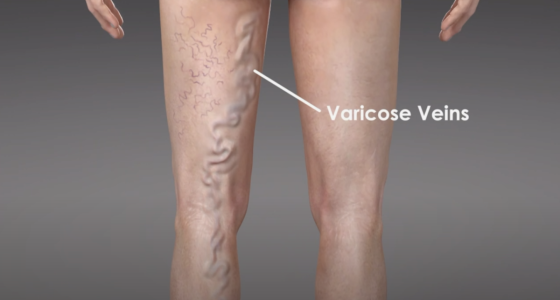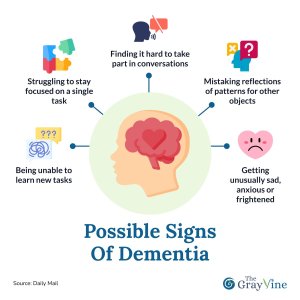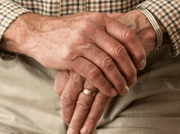Are you ignoring this common leg issue? It could secretly raise your dementia risk by 25%
- Replies 0
Disclaimer: The information provided in this article is for educational purposes only and is not intended as a substitute for professional medical advice, diagnosis, or treatment. Always consult your physician or other qualified healthcare providers with any questions you may have regarding a medical condition or before making any changes to your health regimen.
When we think about dementia, most of us picture memory lapses, confusion, and the heartbreak of watching loved ones fade away.
But what if we told you that a leg problem as ordinary as this one could quietly increase your risk of developing dementia by nearly a quarter?
The Surprising Link: Varicose Veins and Dementia
Varicose veins are incredibly common, affecting about 11 million men and 22 million women in the US alone.
They’re those swollen, twisted veins that often appear on the legs and feet, sometimes causing pain, swelling, or skin changes. For many, they’re just a cosmetic nuisance. But this new research suggests they could be a red flag for something much more serious.
Researchers analyzed health data from nearly 400,000 adults in Korea, tracking them for an average of 13 years.
They found that people with varicose veins were 23.5% more likely to be diagnosed with dementia than those without. This increased risk held true even after accounting for other factors like age, sex, weight, smoking, and alcohol use.

Who’s Most at Risk?
The study found that the risk was especially high for men, current smokers, and heavy drinkers with varicose veins.
While the research focused on a Korean population, the sheer size of the study and the universality of varicose veins suggest these findings are relevant for Americans, too.
Why Might Varicose Veins Affect the Brain?
The exact reasons for the link aren’t fully understood, but experts have a few theories:
What Are Varicose Veins, and Who Gets Them?
Varicose veins are enlarged, twisted veins that usually appear just under the skin of the legs. They can cause aching, swelling, and sometimes skin ulcers or blood clots. Risk factors include:
Dementia: A Growing Concern
Dementia isn’t just a personal tragedy—it’s a public health crisis. Nearly 7 million Americans are living with dementia, and that number is expected to soar as our population ages.
The costs—emotional, physical, and financial—are staggering, with families often bearing the brunt of care.

What Can You Do?
The good news? There are steps you can take to protect both your veins and your brain:
1. Don’t Ignore Varicose Veins: If you have varicose veins, talk to your doctor—not just for cosmetic reasons, but for your overall health. Treatments range from compression stockings to minimally invasive procedures that close off or remove the affected veins.
2. Get Moving: Regular exercise improves circulation, helps maintain a healthy weight, and is one of the best things you can do for your brain.
3. Quit Smoking and Limit Alcohol: Both are major risk factors for vascular problems and dementia.
4. Manage Blood Pressure and Cholesterol: Keeping your heart and blood vessels healthy is key to protecting your brain.
5. Watch for Warning Signs: If you notice new or worsening memory problems, confusion, or changes in mood or behavior, don’t wait—see your healthcare provider.
Also read: Unexpected link: Could this simple health step support your brain as you age?
What About Treatment?
The study found that people who had their varicose veins treated were significantly less likely to develop vascular dementia. Treatments include:
Source: Cleveland Clinic / Youtube.
If you’re experiencing pain, swelling, or skin changes—or if you’re just concerned about your risk—ask your doctor about your options.
Read next: Scientists reveal a 5-minute daily habit that could slash your dementia risk!

Let’s keep the conversation going—because when it comes to our health, every little bit of knowledge helps!
When we think about dementia, most of us picture memory lapses, confusion, and the heartbreak of watching loved ones fade away.
But what if we told you that a leg problem as ordinary as this one could quietly increase your risk of developing dementia by nearly a quarter?
The Surprising Link: Varicose Veins and Dementia
Varicose veins are incredibly common, affecting about 11 million men and 22 million women in the US alone.
They’re those swollen, twisted veins that often appear on the legs and feet, sometimes causing pain, swelling, or skin changes. For many, they’re just a cosmetic nuisance. But this new research suggests they could be a red flag for something much more serious.
Researchers analyzed health data from nearly 400,000 adults in Korea, tracking them for an average of 13 years.
They found that people with varicose veins were 23.5% more likely to be diagnosed with dementia than those without. This increased risk held true even after accounting for other factors like age, sex, weight, smoking, and alcohol use.

A Korean study has found that people with varicose veins have a 23.5 per cent higher risk of being diagnosed with dementia. Image source: Ana Dujmovic / Unsplash.
Who’s Most at Risk?
The study found that the risk was especially high for men, current smokers, and heavy drinkers with varicose veins.
While the research focused on a Korean population, the sheer size of the study and the universality of varicose veins suggest these findings are relevant for Americans, too.
Why Might Varicose Veins Affect the Brain?
The exact reasons for the link aren’t fully understood, but experts have a few theories:
- Poor Circulation: Varicose veins are a sign of weakened blood flow in the legs. Poor circulation throughout the body—including to the brain—has long been recognized as a risk factor for dementia, especially vascular dementia, which is caused by reduced blood supply to the brain.
- Inflammation: Chronic inflammation is another possible culprit. Varicose veins may contribute to widespread inflammation in the body, which can damage blood vessels and brain cells over time.
- Mini-Strokes: The study found that people who had their varicose veins treated were 43% less likely to develop vascular dementia, a type of dementia caused by small, often unnoticed strokes that gradually rob the brain of function.
What Are Varicose Veins, and Who Gets Them?
Varicose veins are enlarged, twisted veins that usually appear just under the skin of the legs. They can cause aching, swelling, and sometimes skin ulcers or blood clots. Risk factors include:
- Age: The odds increase as you get older.
- Gender: Women are more likely to develop them, especially during pregnancy (nearly 40% of expectant mothers experience them).
- Family History: Genetics play a role.
- Lifestyle: Standing or sitting for long periods, being overweight, and smoking all raise your risk.
Dementia: A Growing Concern
Dementia isn’t just a personal tragedy—it’s a public health crisis. Nearly 7 million Americans are living with dementia, and that number is expected to soar as our population ages.
The costs—emotional, physical, and financial—are staggering, with families often bearing the brunt of care.

The increased dementia risk remained even after accounting for factors like age, sex, weight, smoking and alcohol use, and was especially high among men, smokers and heavy drinkers. Image source: Cleveland Clinic / Youtube.
What Can You Do?
The good news? There are steps you can take to protect both your veins and your brain:
1. Don’t Ignore Varicose Veins: If you have varicose veins, talk to your doctor—not just for cosmetic reasons, but for your overall health. Treatments range from compression stockings to minimally invasive procedures that close off or remove the affected veins.
2. Get Moving: Regular exercise improves circulation, helps maintain a healthy weight, and is one of the best things you can do for your brain.
3. Quit Smoking and Limit Alcohol: Both are major risk factors for vascular problems and dementia.
4. Manage Blood Pressure and Cholesterol: Keeping your heart and blood vessels healthy is key to protecting your brain.
5. Watch for Warning Signs: If you notice new or worsening memory problems, confusion, or changes in mood or behavior, don’t wait—see your healthcare provider.
Also read: Unexpected link: Could this simple health step support your brain as you age?
What About Treatment?
The study found that people who had their varicose veins treated were significantly less likely to develop vascular dementia. Treatments include:
- Compression Stockings: Help improve blood flow and reduce swelling.
- Sclerotherapy: A solution is injected into the vein, causing it to collapse and fade.
- Laser or Radiofrequency Ablation: Minimally invasive procedures that close off the affected veins.
- Surgical Removal: In severe cases, the vein may be removed.
Source: Cleveland Clinic / Youtube.
If you’re experiencing pain, swelling, or skin changes—or if you’re just concerned about your risk—ask your doctor about your options.
Read next: Scientists reveal a 5-minute daily habit that could slash your dementia risk!
Key Takeaways
- A Korean study has found that people with varicose veins have a 23.5 per cent higher risk of being diagnosed with dementia.
- The increased dementia risk remained even after accounting for factors like age, sex, weight, smoking and alcohol use, and was especially high among men, smokers and heavy drinkers.
- Patients who received treatment for their varicose veins were 43 percent less likely to suffer from vascular dementia compared to those who did not undergo treatment.
- Although a link was identified, experts say further research is needed to understand the cause, and note that the study’s results may not be directly applicable to populations outside Korea.
Let’s keep the conversation going—because when it comes to our health, every little bit of knowledge helps!







